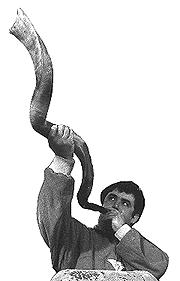 I remember the first time I saw my father mess up. He was up there, as usual, on the bimah. I must have been seven or eight. The cantor, in his authoritative movie-announcer-quality voice, boomed: TEKIYAA GEDOLAAH. It prompted my father to blow the most drawn-out sound of the shofar sequence. My father's lips to the horn. A sputtering airy sound. I panicked. I had always been taught that when someone could not get a sound out of the shofar, it was because the Jewish incarnation of Satan was stuck in there, jamming the soundwaves. I looking around cautiously at the congregants from my perch on the women's balcony. I can't be sure, this many years later, but I think I was ashamed. My invincible father, suddenly stopped up by the devil. It wasn't fair, it wasn't like the rest of the congregants had their deeds and merits and vulnerabilities out in the open like this. Sure, they had to pray and atone and bang their chests, but they got to do it from their seats, in the comfort of their own prayerbooks. But for one hot scary minute, until the sound eeked out, my father's demons became everyone's demons. My panic became everyone's panic. For one minute, everyone looked up from their books, waiting for the next sound.
I remember the first time I saw my father mess up. He was up there, as usual, on the bimah. I must have been seven or eight. The cantor, in his authoritative movie-announcer-quality voice, boomed: TEKIYAA GEDOLAAH. It prompted my father to blow the most drawn-out sound of the shofar sequence. My father's lips to the horn. A sputtering airy sound. I panicked. I had always been taught that when someone could not get a sound out of the shofar, it was because the Jewish incarnation of Satan was stuck in there, jamming the soundwaves. I looking around cautiously at the congregants from my perch on the women's balcony. I can't be sure, this many years later, but I think I was ashamed. My invincible father, suddenly stopped up by the devil. It wasn't fair, it wasn't like the rest of the congregants had their deeds and merits and vulnerabilities out in the open like this. Sure, they had to pray and atone and bang their chests, but they got to do it from their seats, in the comfort of their own prayerbooks. But for one hot scary minute, until the sound eeked out, my father's demons became everyone's demons. My panic became everyone's panic. For one minute, everyone looked up from their books, waiting for the next sound.
The two elements of the mythology of primal scream therapy that amaze me the most are (1) the emphasis on insincere means to get to dauntingly sincere ends, and (2) its blatantly public nature.
To this day, it is hard for me to believe that my father so willing put - and continues to put - his insides on display. I think of my own complete unwillingness to make myself vulnerable - even in private - and wonder if I could ever bring myself to let go enough to scream the name of an old ghost - say, for example, and old yeshiva high school administrator of mine who used to chide me for my immodest Rayanne Graf-esque delusions of stylistic grandeur - in a group setting without completely losing it.
But I guess that's the point. The words atone and judgment have never had a wild or radical ring to them. Then again, neither have stoic or benevolent or, er, bran-eating. And maybe Rosh Hashana and Yom Kippur have something else in mind, something more far-out than I've ever given them credit for. More probing, even, than prayer. Atonement not as silent, mumbly chest-banging, but as public performance, a shameless communal banging-out. And judgment not as pews and books and while tallitot but as animal skins and animal horns and macabre celebration of the occasional necessary regression.
A far cry from lo-fi. Tears for Fears to my Belle and Sebastian. A couple days of "People of the Noise" out of a whole-year-cycle of "People of the Book." A moment's "primal" to a life of "unfazed." And perhaps one of Judaism's best kept secrets momentarily pantsed and decloseted for a world of congregants, perhaps a baby step closer to their own primally screaming Jewish selves, whether they know it yet or not.

August, 2003
Douglas Rushkoff talks with Zeek about the future of Judaism
Sex, drugs, and God in all
June, 2003
April, 2003
October, 2002
What draws protesters to banal holocaust art?
Am I an environmentalist for the same reasons I don't like to spend money?
July, 2003
July, 2003
Jewish sex radicalism in the New World Order
May, 2003
James Turrell and the truth of light
April, 2003
The soft borders between Jewish particularism and universalism
February, 2003
The rich are ripping us off! What are you gonna do about it?
April, 2002
A Eulogy for the Soul of Rock & Roll
November, 2002
April, 2002
April, 2002



Carrying Light into Dark Times
Rabbi Zalman Schachter-Shalomi
With a Bible and a Gun:
The Prohetic Justice of Johnny Cash
Samuel Hayim Brody
Season of Revision
Jay Michaelson
Primal Scream Judaism
Temima Fruchter
More than This
Dan Friedman
Josh's Dinner
Josh Ring
Archive
Our 390 Back Pages
Saddies
David Stromberg
Zeek in Print
Buy online here
About Zeek
Events
Contact Us
Links
From previous issues:
Lifelike College Nudes
Tom Slattery
What is Burning Man?
Jay Michaelson
Trembling Before You
Matthue Roth